A new test can predict your response to exercise, but the real lesson is in patience.
Heard of a VO2 max? Probably, but did you know that a low maximal oxygen consumption is a strong risk factor for premature mortality? That’s just one of the reasons exercise is so good for you. But a new test can help you find out just what type of impact exercise will have on your body.
XRGenomics sells a test where you swab your cheek and return the sample to the company. The idea stems from research studying the efficacy of endurance exercise, which increases VO2max with a very wide range of effectiveness in humans. The original research published in a landmark 2010 study looked into the DNA of people who respond well to exercise, and those who don’t—like your friend who drops 20 pounds picking up jogging, while you’ve been jogging for years and barely lost ten.
Researchers found that about 30 variations in how genes were expressed had a significant effect on how fit people became. A subsequent study echoed these findings and suggested that new means are needed to personalize endurance, strength, and especially combined endurance and strength training programs for optimal individual adaptations. The uncovered gene profile accounts for at least 23 percent of the variation in how people respond to endurance training.
The New York Times quotes Dr. Timmons, one of the founders of XRGenomics, “The idea is to help people to understand why” they might be progressing more slowly in an exercise program than their training partners are. Presumably, the test would educate and motivate, allowing a slower-gainer to give themselves more time with less pressure to achieve their goals.
The new test can predict your response to exercise, but the real lesson is in patience.
Image: Some rights reserved by mikebaird

